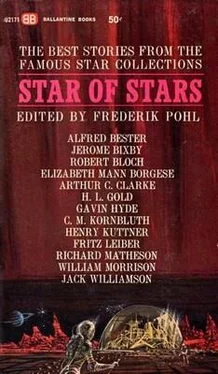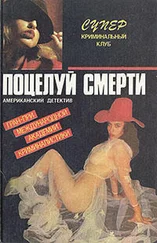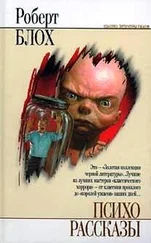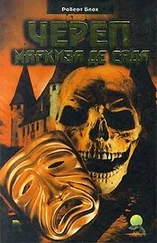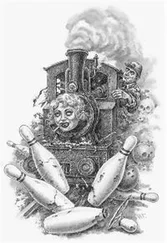Up in the sky the warheads whirled, and the thunder of their passing shook the mountain.
Deep in his vaulted sanctuary he sat, godlike and inscrutable, marking neither the sparrow's nor the missile's fall. There was no need to leave his shelter to stare down at the city.
He knew what was happening—had known ever since early in the evening when the television flickered and died. An announcer in the holy white garb of the healing arts had been delivering an important message about the world's most popular laxative—the one most people preferred, the one four out of five doctors used them-selves. Midway in his praise of this amazing new medical discovery he had paused and advised the audience to stand by for a special bulletin.
But the bulletin never came; instead the screen went blank and the thunder boomed.
All night long the mountain trembled, and the seated man trembled too; not with anticipation but with realization. He had expected this, of course, and that was why he was here. Others had talked about it for years; there had been wild rumors and solemn warnings and much muttering in taverns. But the rumor-mongers and the warning-sounders and the tavern-mutterers had made no move. They had stayed in the city and he alone had fled.
Some of them, he knew, had stayed to stave off the inevitable end as best they could, and these he saluted for their courage. Others had attempted to ignore the future, and these he detested for their blindness. And all of them he pitied.
For he had realized, long ago, that courage was not enough and that ignorance was no salvation. Wise words and foolish words are one—they will not halt the storm. And when the storm approaches, it is best to flee.
So he had prepared for himself this mountain retreat, high over the city, and here he was safe; would be safe for years to come. Other men of equal wealth could have done the same, but they were too wise or too foolish to face reality. So while they spread their rumors and sounded their warnings and muttered in their cups, he built his sanctuary; lead-guarded, amply provisioned, and stocked with every need for years to come, including even a generous supply of the world's most popular laxative.
Dawn came at last and the echoes of the thunder died, and he went to a special, shielded place where he could sight his spyglass at the city. He stared and he squinted, but there was nothing to be seen—nothing but swirling clouds that billowed blackly and rolled redly across the hazed horizon.
Then he knew that he must go down to the city if he wanted to find out, and made due preparations.
There was a special suit to wear, a cunning seamless garment of insulated cloth and lead, difficult and costly to obtain. It was a top secret suit; the kind only Pentagon generals possess. They cannot procure them for their wives, and they must steal them for their mistresses. But he had one. He donned it now.
An elevated platform aided his descent to the base of the mountain, and there his car was waiting. He drove out, the shielded doors closing automatically behind hint, and. started for the city. Through the eyepiece of his insulated helmet he stared out at a yellowish fog, and he drove slowly, even though he encountered no traffic nor any sign of life.
After a time the fog lifted, and he could see the countryside. Yellow trees and yellow grass stood stiffly silhouetted against a yellow sky in which great clouds writhed and whirled.
Van Gogh's work, he told himself, knowing it was a lie. For no artist's hand had smashed the windows of the farmhouses, peeled the paint from the sides of the barns, or squeezed the warm breath from the herds huddling in the fields, standing fright-frozen but dead.
He drove along to the broad arterial leading to the city; an arterial which ordinarily swarmed with the multi-colored corpuscles of motor vehicles. But there were no cars moving today, not in this artery.
Not until he neared the suburbs did he see them, and then he rounded a curve and was halfway upon the vanguard before he panicked and halted in a ditch.
The roadway ahead was packed with automobiles as far as the eye could see—a solid mass, bumper to bumper, ready to descend upon him with whirring wheels.
But the wheels were not turning.
The cars were dead. The further stretches of the highway were an automobile graveyard. He approached the spot on foot, treading with proper reverence past the Cadillac-corpses, the cadavers of Chevrolets, the bodies of Buicks. Close at hand he could see the evidence of violent ends; the shattered glass, the smashed fenders, the battered bumpers and twisted hoods.
The signs of struggle were often pitiable to observe; here was a tiny Volkswagen, trapped and crushed between two looming Lincolns; there an MG had died beneath the wheels of a charging Chrysler. But all were still now. The Dodges dodged no longer, the Hornets had ceased their buzzing, and the Ramblers would never ramble again.
It was hard for him to realize with equal clarity the tragedy that had overtaken the people inside these cars—they were dead, too, of course, but somehow their passing seemed insignificant. Maybe his thinking had been affected by the attitude of the age, in which a man tended to be less and less indentified as an individual and more and more regarded on the basis of the symbolic status of the car he drove. When a stranger rode down the street, one seldom thought of him as a person; one's only immediate reaction was, "There goes a Ford—there goes a Pontiac—there goes one of those big goddam Imperials." And men bragged about their cars instead of their characters. So somehow the death of the automobiles seemed more important than the death of their owners. It didn't seem as though human beings had perished in this panic-stricken effort to escape from the city; it was the cars which had made a dash for final freedom and then failed.
He skirted the road and now continued along the ditch until he came to the first sidewalks of the suburbs. Here the evidence of destruction was accentuated. Explosion and implosion had done their work. In the country, paint had been peeled from the walls, but in the suburbs walls had been peeled from the buildings. Not every home was leveled. There were still plenty of ranch houses standing, though no sign of a rancher in a gray flannel suit. In some of the picturesquely modern white houses, with their light lines and heavy mortgages, the glass side walls remained unshattered, but there was no sign of happy, busy suburban life within—the television sets were dead.
Now he found his progress impeded by an increasing litter. Apparently a blast had swept through this area; his way was blocked by a clutter of the miscellaneous debris of Exurbia.
He waded through or stepped around:
Boxes of Kleenex, artificial shrunken heads which had once dangled in the windows of station-wagons, crumpled shopping-lists and scribbled notices of appointments with psychiatrists.
He stepped on an Ivy League cap, nearly tripped over a twisted barbecue grille, got his feet tangled in the straps of foam-rubber falsies. The gutters were choked with the glut from a bombed-out drugstore; bobbie-pins, nylon bobby-socks, a spate of pocketbooks, a carton of tranquilizers, a mass of suntan lotion, suppositories, deodorants, and a big cardboard cutout of Harry Belafonte obscured by a spilled can of hot fudge.
He shuffled on, through a welter of women's electric shavers, Book-of-the-Month-Club bonus selections, Presley records, false teeth, and treatises of Existentialism. Now he was actually approaching the city proper. Signs of the devastation multiplied. Trudging past the campus of the university he noted, with a start of horror, that the huge football stadium was no more. Nestled next to it was the tiny Fine Arts building, and at first he thought that it too had been razed. Upon closer inspection, however, he realized it was untouched, save for the natural evidence of neglect and decay.
Читать дальше
